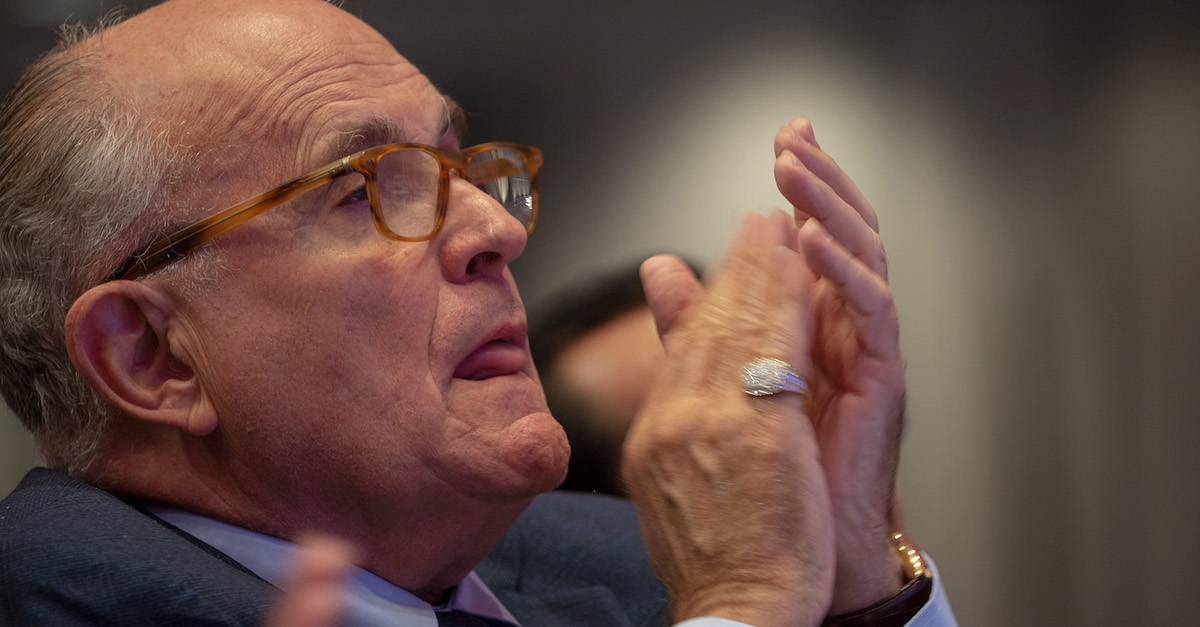
Attorney Douglas N. Letter, Speaker of the House-designate Nancy Pelosi‘s (D-Calif.) choice for general counsel of the House of Representatives, has previously expressed some strong views on the subject of special counsel Robert Mueller‘s final Russia report.
In case you missed it, Pelosi announced the hiring on Friday of the 40-year Department of Justice veteran just ahead of Democrats officially taking control of the House in 2019.
As Law&Crime noted earlier, this was seen as a “very big deal.” The Washington Examiner has already dubbed Letter as “The man who could impeach Trump.”
Letter’s résumé speaks for itself. He served for four decades in the Department of Justice and “distinguished” himself as the DOJ’s Director of the Civil Division Appellate Staff. He worked as associate counsel to President Bill Clinton, worked as Attorney General Janet Reno‘s Deputy Associate Attorney General and worked as Attorney General Eric Holder‘s senior counselor. He has worked as a senior litigator at the Institute for Constitutional Advocacy and Protection at the Georgetown University Law Center. He has taught law at Georgetown and, in at least one case, wrote about the Mueller Probe.
Letter penned an article for Just Security in Sept. 2018, months after he left the DOJ, criticizing President Donald Trump‘s attorney Rudy Giuliani and the invocation of “executive privilege” — “The privilege that allows the president and other high officials of the executive branch to keep certain communications private if disclosing those communications would disrupt the functions or decision-making processes of the executive branch.”
Bear in mind that it was believed that President Trump‘s “attacks on the Justice Department” made it “easier” for Letter to leave the DOJ back in Jan. 2018 (Letter said, “One obviously has to be concerned about the Justice Department and the future of the Justice Department”).
Letter argued that Giuliani has been trotting out a “red herring” by asserting executive privilege as “a way to bury at least parts of Special Counsel Robert Mueller’s much-anticipated report at the end of his investigation.” Letter said at the time that worries about this were actually “premature and misplaced,” while also saying that worries about whether Mueller’s full report “will see the light of day [were] entirely well placed.”
“It’s time to focus on where the real threat to Mueller’s report reaching the public may arise,” he said. “The assertion of executive privilege is not it.”
Letter then slammed Giuliani for misleading the American people with a “potentially dangerous distraction” by encouraging the public and pundits to debate about this “red herring”:
In the final analysis, talk of executive privilege in this context is a distraction. It suggests that experts should be debating the legal basis on which Trump might try to bury Mueller’s report. But the President’s power, properly understood, means that executive privilege is a red herring at this point, and, indeed, a potentially dangerous distraction insofar as it pushes our public discourse toward debating the relevance and legality of the privilege’s assertion. Whether Mueller’s report is hidden from the public is, simply put, a choice for the President to make. It’s the type of choice for which the American public is entitled to hold the President responsible. And, if the President makes the dangerous and foolish decision to keep Mueller’s work from the American people, outrage should be directed not at legal doctrines involving executive privilege, but at a President who will have made a most regrettable decision.
In reality, Letter said, the issue at hand boils down to whether Trump himself will “exercise the authority he possesses to intervene and stop the American people from seeing Mueller’s critical conclusions.” In other words, it’s about the mere choice to do so, not legal jargon and legal justification.
At the time the article was written, Deputy Attorney General Rod Rosenstein had the final say on what to parts of the report to release to the public. He was the one who appointed Mueller as special counsel and oversaw the probe given Jeff Sessions recusal. With Sessions’ departure as Attorney General, Matthew Whitaker’s ascent to acting Attorney General and the possibility of William Barr stepping in next, things have in some ways changed and in other ways not changed at all.
Ultimately, Letter said, “In deciding whether the public interest calls for public release of Mueller’s final report, the Attorney General will be subject to the direction and control of the President.”
Letter did allow for the possibility that Trump’s actions “toward the Attorney General concerning the Mueller investigation might meet the definition of obstruction of justice in certain circumstances,” but he declined to go deeper into the “thorny” and “difficult issue.”
Letter said Friday that he was looking forward to the opportunity to serve as general counsel for the House of Representatives.
“I am eager to apply my litigation experience as I take on the challenges and opportunities that come with the important position of House General Counsel,” he said.
[Image via Tasos Katopodis/Getty Images]